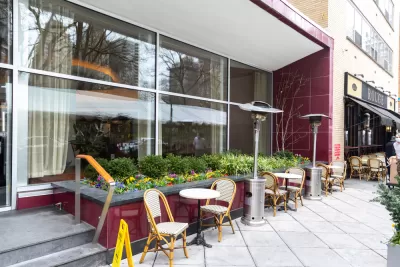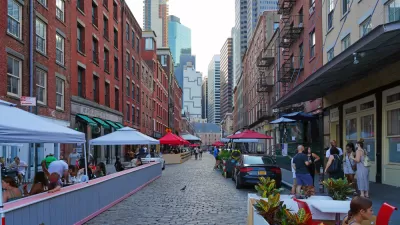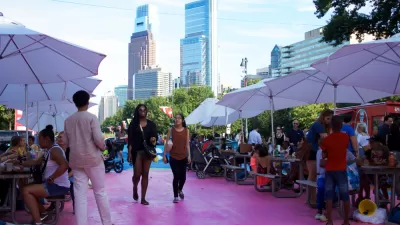Restaurant owners argue that new requirements for the city’s permanent outdoor dining program are practically impossible for most of them to meet.

In an opinion piece for Philadelphia Magazine, Mike Strauss, co-owner of two Philadelphia restaurants, denounces the city’s updates to outdoor dining rules that, according to Strauss, “made it impossible for most restaurants to meet the requirements by the January 9th deadline.” According to Strauss, “When the city made the outdoor dining program permanent, it felt like they were telling us: ‘We are here to help, but only 10 percent of you.’”
As Strauss points out, other cities are treating the issue differently. “In New York City, the city has spent over a year speaking with legislative groups, neighborhood associations and businesses (not just restaurants) to come up with a program that could benefit small businesses while addressing concerns over traffic safety and accessibility.” But as cities decide the future of these programs, restaurant owners in other cities have experienced similar sticker shock when new requirements were issued.
Strauss stresses the importance of vibrant public spaces, including outdoor dining. As he puts it, “Philly is a great place to visit not because it’s a great place to park. Seeing people outside — enjoying themselves, laughing, eating — is much better than staring at cars.” Research bears this out, indicating that outdoor dining and open streets boost local business and economic activity.
FULL STORY: Our City Chose Illegal Parking Over Its Vibrant Dining Scene

Planetizen Federal Action Tracker
A weekly monitor of how Trump’s orders and actions are impacting planners and planning in America.

Congressman Proposes Bill to Rename DC Metro “Trump Train”
The Make Autorail Great Again Act would withhold federal funding to the system until the Washington Metropolitan Area Transit Authority (WMATA), rebrands as the Washington Metropolitan Authority for Greater Access (WMAGA).

The Simple Legislative Tool Transforming Vacant Downtowns
In California, Michigan and Georgia, an easy win is bringing dollars — and delight — back to city centers.

The States Losing Rural Delivery Rooms at an Alarming Pace
In some states, as few as 9% of rural hospitals still deliver babies. As a result, rising pre-term births, no adequate pre-term care and "harrowing" close calls are a growing reality.

The Small South Asian Republic Going all in on EVs
Thanks to one simple policy change less than five years ago, 65% of new cars in this Himalayan country are now electric.

DC Backpedals on Bike Lane Protection, Swaps Barriers for Paint
Citing aesthetic concerns, the city is removing the concrete barriers and flexposts that once separated Arizona Avenue cyclists from motor vehicles.
Urban Design for Planners 1: Software Tools
This six-course series explores essential urban design concepts using open source software and equips planners with the tools they need to participate fully in the urban design process.
Planning for Universal Design
Learn the tools for implementing Universal Design in planning regulations.
Smith Gee Studio
City of Charlotte
City of Camden Redevelopment Agency
City of Astoria
Transportation Research & Education Center (TREC) at Portland State University
US High Speed Rail Association
City of Camden Redevelopment Agency
Municipality of Princeton (NJ)





























